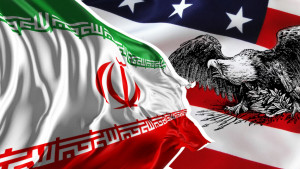
Iran, therefore, is clearly poised to un-doing the Saudi-US regional agenda. In this context, the missile strike has amply demonstrated not only the extent to which it can go, but also shown who it can target in the region. ISIS is far from the only force and entity that the Iranian missiles can wash away. This is pretty evident from the official message given by the Chief of Staff of Iran’s armed forces, Gen. Mohammad Hossein Baqueri, who said in the next morning after the strike, “Iran is among the world’s big powers in the missile field. They (read the US and its allies) don’t have the capability to engage in conflict with us at present, and of course, we don’t intend to involve in clashes with them, but we are in permanent rivalry with them in different fields, including the missile sector.”
Gen. Ramazan Sharif of the Guard told state television in an interview, “The Saudis and Americans are especially receivers of this message,” he said. “Obviously and clearly, some reactionary countries of the region, especially Saudi Arabia, had announced that they are trying to bring insecurity into Iran.”
Gen. Yahya Rahim Safavi, a military aide to Supreme Leader Ali Khamenei, had specifically forewarned Washington last Wednesday that “if the US decides to start any war against Iran, all its military bases in the region will experience insecurity.”
Clearly, the missile strike constitutes a snub to the US Senators who have already passed a bill, imposing more sanctions against Iran over its missile program. It is also a defiant response to US Secretary of State Rex Tillerson’s ill-conceived remark that the Trump administration’s policy towards Iran includes “regime change”. While this is nothing short of an interventionist plan, it also shows that the US-Iran nuke deal has already become meaningless and failed to deter the US from deliberately drawing Iran in a military conflict. This is self-evident from the way Rex Tillerson chose to call the latest US-Saudi Arabia weapons deal as the one that would enable the latter to deal with “malign Iranian influence.” Hence, conflict escalation in and around Syria.
For a start, the Iranian leadership seems to have concluded that the strategic restraint exercised over the past 3-4 years since negotiations on the nuclear issue began, is being misunderstood by the Trump team. On Sunday, Khamenei launched a vitriolic attack on US policies. As Tehran sees it, the Trump team, which lacks experience in international diplomacy, might harbour notions that Iran’s moderation in recent years is a sign of weakness or lack of political resolve on the part of the moderate-reformist leadership of President Hassan Rouhani. Most certainly, Tehran expects that its iron-fist policy displayed through the strike will serve as a wake-up call to the Trump administration. This finds echo in the words of the influential Secretary of Iran’s Expediency Council Mohsen Rezayee, who is also a former IRGC commander: “After four years in office, Tillerson will come to understand Iran.”
As they said, action speaks louder than words. The choice of missile that Iran has used and the precision with which it hit the target also constitute a clear warning in themselves. From all accounts, the missiles hit their target with devastating precision. Simply put, Iran has notified the US that its 45,000 troops deployed in bases in Iraq (5,165), Kuwait (15,000), Bahrain (7,000), Qatar (10,000), the UAE (5,000) and Oman (200) are highly vulnerable to its homemade Zolfiqar, latest generation mid-range missile, and Qasim, a surface to surface cruise missile.
The Iranian action has not come without confidence in its allies. While the shooting down of a Syrian jet by the US did invite strong criticism from Moscow, indicating the latter’s intent to stand with the Syrian regime against a multi-faceted attack; Iran has been further bolstered by the rapidly enhancing co-operation with China.
As such, at a time when the US and Saudi Arabia have been stepping up efforts to isolate Iran, China is doubling down on support for its regional ally. Chinese and Iranian destroyers are conducting a joint military drill in the eastern portion of the Strait of Hormuz and Sea of Oman as reports have emerged, citing the Islamist Republic News Agency.
Iranian military action in Syria has, therefore, not happened in a regional void—something that the US administration can lose sight of only at the expense of complicating the war against terror, a war that the US although claims to be fighting but is not fighting in a way that might help (read: the American Complicity with Terrorism) the forces actually fighting this war against ISIS and other “takfiri” groups. The Iranian strike, in this behalf, strongly refutes the Western/Saudi claims that Iran is fomenting terror in the region. On the contrary, it tells a lot about Iran’s national-resolve to fight terror by all possible means—and the means have certainly been upgraded from having ground presence to launching direct missile strikes.
Salman Rafi Sheikh, research-analyst of International Relations and Pakistan’s foreign and domestic affairs, exclusively for the online magazine “New Eastern Outlook”.
